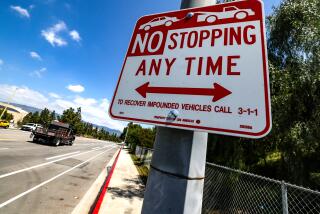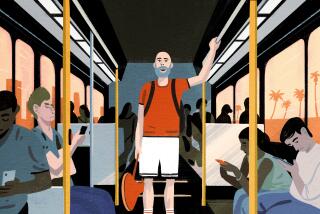Editorial: Psst ... wanna buy a parking spot?
In Los Angeles, parking your car on the street can be almost as stressful as driving it in traffic. Day after day, motorists repeat the same drill in the congested neighborhoods of the city: They weave up and down the streets, eyes peeled for an empty spot or a driver sitting in a parked car. (Is he maneuvering out or angling his way in?) Then they circle the block again and maybe again, getting sadder and madder with each loop.
In the last few years, the city’s Department of Transportation has tried to make the search for parking more efficient and less frustrating. It has raised the price of meters in high-traffic communities to encourage more turnover in parking spaces. A smartphone app called Parker, developed by a private San Francisco firm in partnership with the city’s Department of Transportation, has been operating for several years in Hollywood and Studio City and for a couple of years in Venice. Based on information obtained by wireless sensors in the parking spaces, it alerts drivers to available metered spots on certain streets and cuts down on the random circling.
Now there is a new app promising the kind of sharing-economy efficiency that has been proclaimed by Uber and Lyft and Airbnb. It allows drivers in parked cars to let others know when they are leaving parking spots — and to turn the space over to the next driver for a fee. The MonkeyParking app, which was created and first tried in parking-space-deprived Rome, lets a driver who is leaving a parking space, whether it is metered or not, essentially auction off that space to the driver in the area who bids the highest for it. The winning bidder coordinates with the parked driver to slip into the space as the driver leaves.
Drivers may find it appealing, but city officials don’t. In San Francisco, the city attorney called it “predatory” and ordered MonkeyParking to “cease and desist,” saying the app violated a city law banning companies from buying, selling or leasing on-street parking. In Santa Monica this summer, the then-city parking administrator denounced it as “immoral,” and the city staff will recommend that the City Council ban it. In Los Angeles — where it’s not even available yet — the City Council has already ordered the city attorney to draft an ordinance banning it. Councilman Mike Bonin said such an app could easily be abused by people “pimping out a space” in popular parts of the city or during special events when parking is particularly difficult to come by. “You’re basically selling a public asset for your own personal profit,” said Bonin.
MonkeyParking’s CEO says that’s not what is being sold. He says the app technically just sells knowledge about a space, not the space itself. But if drivers are actually holding the spaces until the winning bidder can slip in, they’re not just selling knowledge. And if they’re not holding the spaces, then what’s the use of the app?
The system does seem ripe for abuse. Wouldn’t it incentivize drivers to sit in their spaces until they got the bid they were looking for? Worse yet, could an entrepreneurial user commandeer a group of drivers to hold lots of parking spaces hostage on, say, Abbot Kinney in Venice, to be released only for the highest ransom? Maybe. Then there’s the safety issue: Do we really want drivers who are distractedly looking for parking spaces to also be reading and texting and calculating bids on their smartphones at the same time? (Yes, you could have a passenger in the car do it — if you have a passenger.)
Perhaps the market won’t bear much predatory auctioning. Perhaps drivers looking for parking won’t take kindly to a driver hogging a spot while texting that he or she will leave it for $5. Perhaps MonkeyParking will become socially unacceptable.
What would really alleviate parking stress in the city would be a wider rollout of the Parker app that simply alerts drivers to open parking spaces and to public garages and lots. The app was announced with great fanfare four years ago by then-Mayor Antonio Villaraigosa, then-City Councilman Eric Garcetti and transportation officials at a news conference, where they hailed it as a major innovation that would help frustrated drivers in Hollywood. Assuming it’s effective, it’s time for now-Mayor Garcetti to push that innovation out to more of the city.
Follow the Opinion section on Twitter @latimesopinion
More to Read
A cure for the common opinion
Get thought-provoking perspectives with our weekly newsletter.
You may occasionally receive promotional content from the Los Angeles Times.






